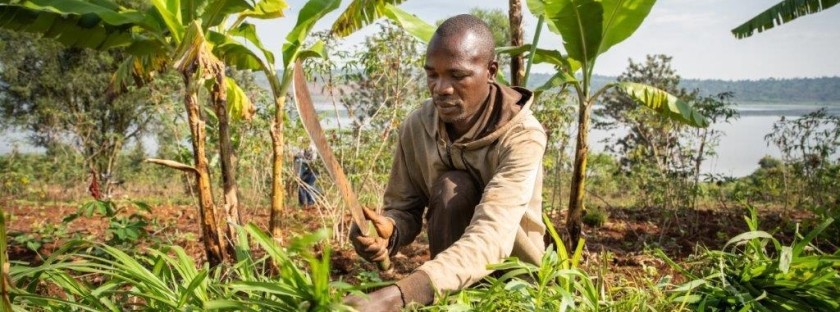Philbert Ntaciyica tends to his farm in Burundi’s Nzove village. Like many farmers in the area, increasingly erratic outbursts of heavy rain are washing his crops and topsoil downhill into the lake below. Photo: UNEP/Lisa Murray
Farmers adapt to climate crisis on Burundi’s precarious hillsides
It was a late evening in April 2018 when Philbert Ntaciyica, exhausted from the non-stop heavy rain battering his roof, wondered if his farm would survive this latest storm.
When the 12-hour downpour finally eased in Nzove, a village perched on a hillside in north-eastern Burundi, Ntaciyica emerged from his home to find no crops or topsoil. All had been washed downhill by the deluge, and along with them, his livelihood.
“We had nothing left,” said Ntaciyica. “We were forced to sell our livestock. Our children couldn’t eat well. They went from two meals a day to one.”
Along with most other men in the village, the father-of-six was forced to leave his wife and young children behind and travel to neighbouring Rwanda for work.
“The consequences for the community were enormous. Some children abandoned schools,” the 35-year-old said. “We had to stay strong.”
The storm that ravaged Ntaciyica’s village is part of a wave of extreme weather that has struck Burundi in recent years, a product of climate change, scientists say. Although the nation releases fewer greenhouse gas emissions per capita than almost any other country on Earth, it bears a disproportionately heavy burden from the climate crisis.
A United Nations Environment Programme (UNEP) project funded by the Adaptation Fund is helping Ntaciyica and 2,000 farmers like him to adopt nature-based solutions to adapt to less predictable weather in Burundi.
Continue reading the original article.
Watch the video: Restoring nature helps Burundi farmers adapt to climate change



